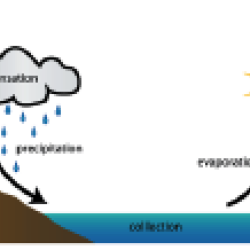Source Institutions
Source Institutions
Add to list Go to activity
Activity link broken? See if it's at the internet archive

Did you know that the water we use today is the same water found on Earth millions of years ago? The Earth constantly uses and recycles water in a process called the water cycle. In this lesson, learners explore the four phases of the water cycle. In the investigation Rain in a Jar, learners use hot water and ice to create condensation and a tiny cloud. In Making a Terrarium, learners create an ecosystem and water cycle by growing plants in a closed environment. Investigation spans several days.
- 10 to 30 minutes
- 1 to 7 days
- $5 - $10 per group of students
- Ages 8 - 14
- Activity, Lesson/Lesson Plan, Model, Simulation
- English
Quick Guide
Materials List (per group of students)
- glass jar with lid or Pyrex bowl and plate to cover it
- hot water
- 2 cups of ice with food coloring
- can of aerosol spray
- lid
- small plastic container
- clear lid or plastic wrap
- 1-1& 1/2 cups potting soil
- lima beans or sunflower seeds
- 1/2 liter bottle of water
- ruler
- marker
- masking tape
- small to medium size box
- thermometers (optional)
- hot water
- student journals and writing tools
Subjects
-
Earth and Space Science
-
Earth Processes
- Weather and Climate
-
Earth Structure
- Oceans and Water
-
Earth Processes
-
Life Sciences
-
Diversity of Life
- Animals
-
Ecology
- Ecosystems
-
Diversity of Life
-
Physical Sciences
-
States of Matter
- Changes of Phase
-
States of Matter
-
The Nature of Science
-
The Scientific Process
- Asking Questions
- Conducting Investigations
- Gathering Data
- Formulating Explanations
- Communicating Results
-
The Scientific Process
Informal Categories
- Gardening
Audience
To use this activity, learners need to:
- see
- read
- touch
Learning styles supported:
- Involves teamwork and communication skills
- Involves hands-on or lab activities
Other
Components that are part of this resource:
Includes alignment to state and/or national standards:
This resource is part of:
Access Rights:
- Free access
By:
Source Collection
- Science After School Consumer's Guide
Rights:
- All rights reserved, State of New Jersey, 2006
Funding Source:
- No Child Left Behind Act of 2001
